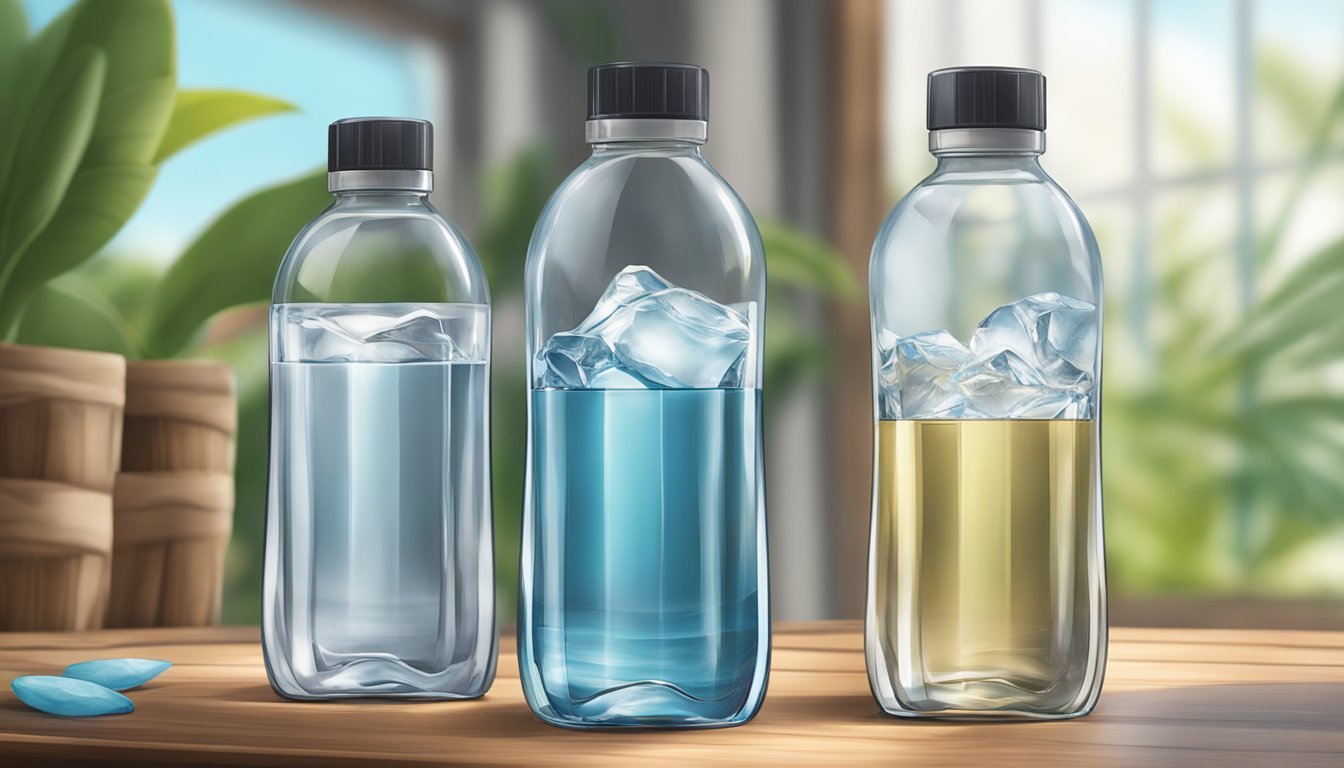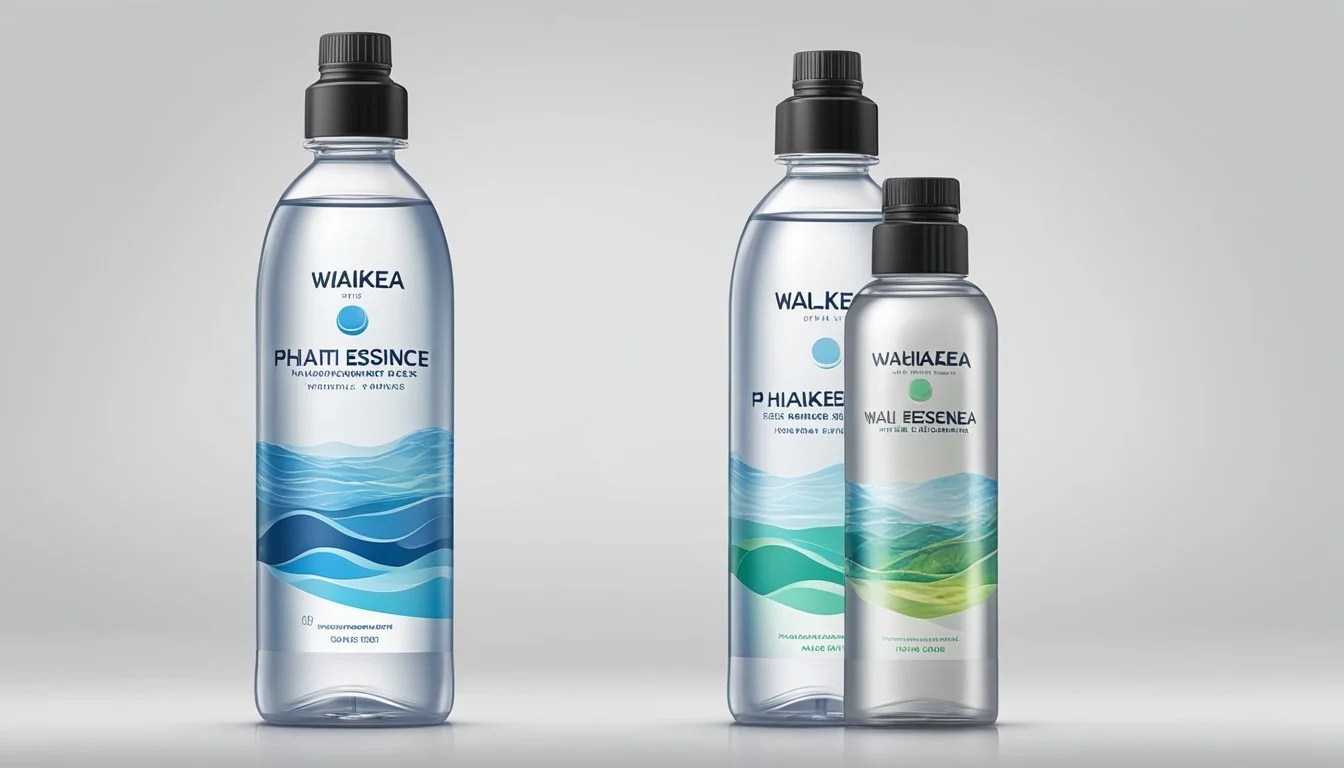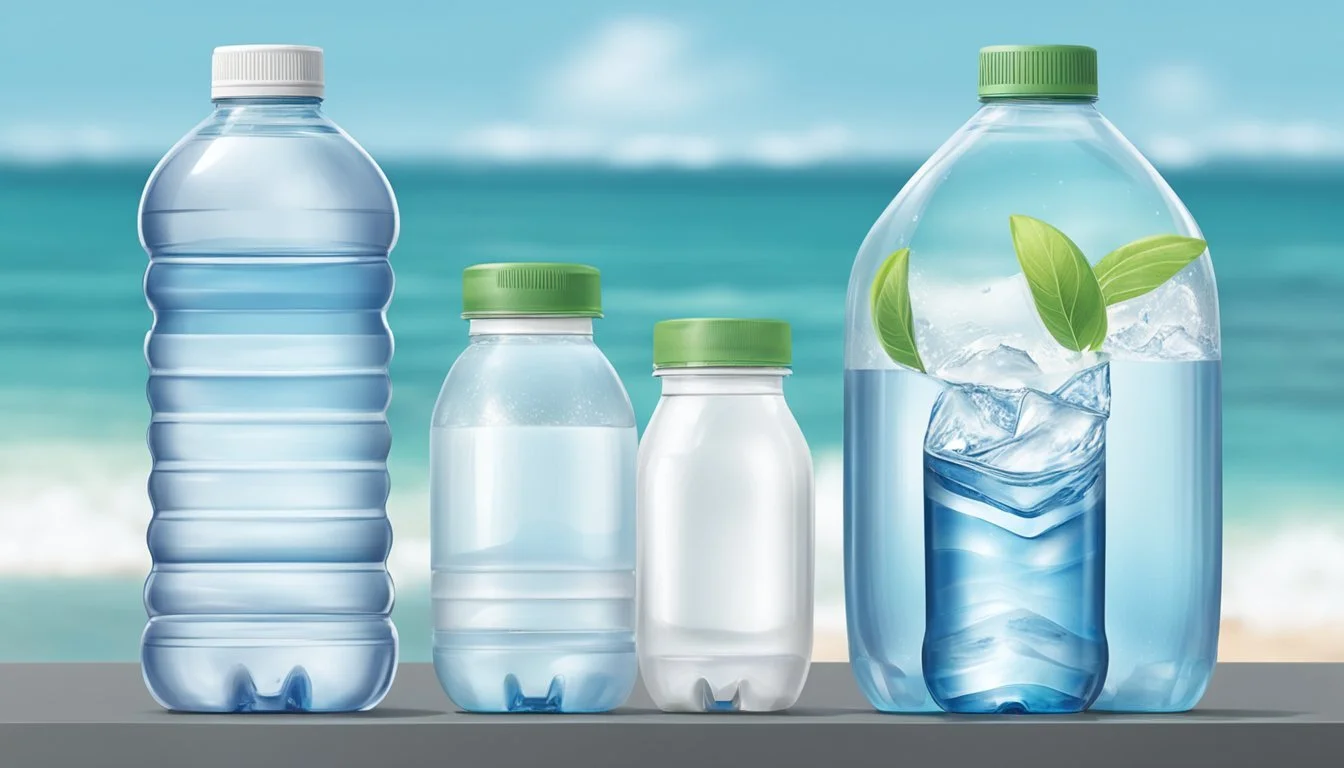Waiakea vs. Essence pH10
Comparing Top Bottled Waters
When it comes to choosing between Waiakea and Essence pH10 bottled water, several factors come into play, including pH levels, mineral content, and sustainability. Waiakea water, with its pH range of 7.6 to 8.2, is naturally alkaline and boasts a unique mineral composition, making it a strong contender for those seeking health benefits and refreshment. Additionally, Waiakea sets itself apart by being bottled directly at the source in Hawaii and utilizing 100% recycled plastic for its bottles.
Essence pH10 offers a different hydration experience, emphasizing a balanced pH level and a clean, crisp taste. While the specific pH level and mineral content of Essence pH10 are tailored for optimal hydration, the brand's focus on premium quality and taste ensures a satisfactory experience for its consumers.
In the battle between Waiakea and Essence pH10, both brands present compelling features that cater to different preferences and needs. Whether it's Waiakea's commitment to sustainability and natural alkalinity or Essence pH10's premium taste and balanced hydration, readers will find valuable insights to help them make an informed choice.
Understanding pH in Bottled Water
The pH level of bottled water can have significant effects on its taste and potential health benefits. This discussion will cover the science of pH levels, the balance between alkalinity and acidity in water, and a comparison of different pH levels in bottled water brands.
The Science of pH Levels
pH is a measure of how acidic or alkaline a substance is, on a scale from 0 to 14. A pH of 7 is considered neutral; below 7 is acidic, and above 7 is alkaline. The scale is logarithmic, meaning each whole number represents a tenfold increase or decrease in acidity/alkalinity.
Water molecules can dissociate into hydrogen (H⁺) and hydroxide (OH⁻) ions. The concentration of these ions determines the pH level. Factors such as mineral content and source impact the pH of bottled water.
Alkalinity and Acidity in Water
Alkaline water has a pH greater than 7. It's known for balancing acid in the stomach, potentially helping with conditions like acid reflux. Minerals like calcium, magnesium, and potassium can increase the pH and add health benefits.
Acidic water, with a pH below 7, can taste sharper and may erode tooth enamel over time. It's less common in bottled water for consumption due to these reasons. Ensuring balanced hydration often involves aiming for a neutral to slightly alkaline pH level.
pH Level Comparisons
Different brands of bottled water vary widely in their pH levels. For example, Waiakea water, sourced from a volcanic well in Hawaii, has a naturally alkaline pH range of 7.6 to 8.2. It also contains essential minerals and electrolytes.
Essence pH10, on the other hand, typically boasts a higher pH, classifying it as more alkaline. Many consumers seek these alkaline options for their purported health benefits. It's critical to choose bottled water that suits individual health needs and taste preferences.
Typical tap water in the US has a pH range of 6.5 to 9.5, depending on the treatment and source. Bottled water brands aim for a balanced range, often between 6.5 and 8.5, to meet consumer expectations for taste and health benefits.
Health Implications of Hydration
Proper hydration is crucial for maintaining body balance, benefiting from essential minerals and electrolytes, and exploring the potential advantages of alkaline water.
Hydration and Body Balance
Hydration plays a key role in regulating body temperature, maintaining joint lubrication, and ensuring the efficiency of bodily functions. Dehydration can lead to problems like reduced cognitive function, mood swings, and digestive issues.
Both Waiakea and Essence pH10 bottled waters provide sufficient hydration. Consuming adequate water daily helps in maintaining an optimal balance within the body’s cells and organs.
Minerals and Electrolytes for Health
Minerals such as calcium, magnesium, and potassium are essential for various bodily processes. Waiakea water, sourced from volcanic wells in Hawaii, contains natural minerals and electrolytes, which aid muscle function and bone health.
Essence pH10 also offers a rich mineral profile, supporting electrolyte balance crucial for muscle contractions and nerve signaling. These minerals help spur the body’s functions, promoting overall health and well-being.
Potential Benefits of Alkaline Water
Alkaline water has gained popularity for its potential health benefits. Waiakea’s pH level ranges from 7.6 to 8.2, while Essence pH10 boasts a higher pH. Alkaline water can assist in neutralizing acidity in the body and may support metabolic processes.
Some consumers believe alkaline water possibly aids in detoxification and improves hydration efficiency. While more research is needed, moderate consumption of alkaline water can supplement a healthy lifestyle.
Brand Profiles
When choosing between Waiakea and Essence pH10 for bottled water, it helps to evaluate their origins, unique characteristics, and what differentiates them. Each offers specific benefits and features that cater to various hydration preferences.
Waiakea: Hawaiian Volcanic Water
Waiakea is recognized for its high-quality Hawaiian volcanic water sourced from the Mauna Loa Volcano. This natural filtration process through volcanic rock gives Waiakea water a distinctive mineral content, enriching it with electrolytes.
pH Level: Waiakea water has a naturally alkaline pH of 8.2. This makes it less acidic and potentially better for neutralizing body acids.
Environmental Responsibility: Committed to sustainability, Waiakea uses 100% recycled plastic for their bottles and is a certified CarbonNeutral® company. Additionally, they focus on giving back to the community through clean water projects in Africa.
Taste: Many consumers describe Waiakea water as having a smooth and crisp taste, attributed to its volcanic filtration.
Essence pH10: Ionized Water
Essence pH10 differentiates itself through its ionization process, which results in a high pH level of 10. This makes it one of the most alkaline bottled water options available.
Ionized and Purified: The production process includes ionization and purification, which enhances the water's alkalinity and removes contaminants.
Nutrient Content: This bottled water is rich in antioxidants, which some believe can help neutralize free radicals in the body.
Packaging: Essence pH10 focuses on maintaining the purity of its product by using high-quality, BPA-free bottles.
Taste: Users often report a refreshing and clean taste with no aftertaste, making it a favorite for those looking for a high-pH water option.
Sourcing and Filtration Methods
Waiakea and Essence pH10 differ significantly in their water sources and filtration methods. These distinctions impact the purity and mineral content of each brand.
Natural Spring Water vs. Purified Tap Water
Waiakea is sourced from natural spring water in Hawaii. This source is renowned for its clean, sustainable supply, offering naturally enriched minerals. The natural filtration through volcanic rocks enhances its purity.
Essence pH10, on the other hand, originates from purified tap water. It undergoes rigorous purification that includes distillation, making it free from contaminants usually found in municipal sources.
Filtration, Reverse Osmosis, and Ionization
Essence pH10 utilizes multiple advanced filtration methods. Reverse osmosis and micro-filtration processes ensure the removal of impurities. An ionization process elevates its pH to 9.5, making it alkaline.
Waiakea employs a more natural approach, relying on the volcanic rock to filter the water. This natural filtration helps retain beneficial minerals while offering clean water that doesn't require extensive additional filtration.
Natural Filtration and Mineral Enrichment
Waiakea's mineral content is a key benefit, providing essential electrolytes and a crisp taste due to natural filtration. The volcanic rock naturally enriches the water with minerals like calcium, magnesium, and silica.
Essence pH10 achieves its mineral profile through controlled processes. Post-filtration, the water is enhanced with electrolytes to improve taste, ensuring it remains consistent in every bottle. This careful balancing adds desirable minerals while maintaining its purity.
Taste and Mineral Content Evaluation
This section focuses on the interaction between pH and taste, assesses the mineral content of both Waiakea and Essence pH10, and examines the overall sensory experience offered by these bottled water brands.
The Relationship Between pH and Taste
The pH level of water significantly impacts its taste. Waiakea, with a pH range of 7.6 to 8.2, offers a mildly alkaline taste that is smooth and well-balanced.
In contrast, Essence pH10, featuring a higher alkaline level, often results in an even smoother taste profile. Higher pH waters are preferred by those sensitive to acidity, delivering a more neutral experience. This makes Essence pH10 a favorable choice for individuals seeking a less acidic taste.
Mineral Profiles: Calcium, Magnesium, and Potassium
Both Waiakea and Essence pH10 boast unique mineral profiles that distinguish them from standard bottled waters.
Waiakea's water passes through volcanic rock, which enriches it with beneficial minerals. Notable components include:
Calcium: Supports bone health.
Silica: Promotes skin, hair, and nail health.
Magnesium: Essential for muscle function.
Essence pH10 also contains a rich array of minerals:
Potassium: Helps maintain electrolyte balance.
Magnesium: Contributes to cardiovascular health.
Calcium: Enhances bone density.
Sensory Experience of Water Brands
The sensory experience of drinking these brands adds to their appeal.
Waiakea is often praised for its clean, refreshing taste with a hint of natural minerals. The inclusion of silica provides an added smoothness, enhancing the overall drinking experience.
Essence pH10, known for its higher alkalinity, delivers a mellow taste appreciated by those who prefer a smoother, less acidic water. The absence of added chemicals ensures a pure and enjoyable flavor.
By evaluating these elements, consumers can better understand which water brand aligns with their taste preferences and nutritional needs.
Environmental and Ethical Considerations
In examining Waiakea and Essence pH10, it is essential to consider their environmental and ethical implications. This examination will focus on their handling of plastic waste, sustainability efforts, and ethical initiatives.
Bottled Water and Plastic Waste
Plastic waste remains one of the most pressing environmental concerns tied to bottled water. Waiakea addresses this by using bottles made from 100% post-consumer rPET (recycled polyethylene terephthalate), significantly reducing their reliance on virgin plastics. Their bottles are also BPA-free, which contributes to consumer health and reduced environmental toxins.
Essence pH10, like many bottled water brands, faces challenges related to plastic waste. Despite some efforts to adopt more environmentally friendly practices, details about their specific initiatives surrounding plastic use are less publicized. Consumers concerned about plastic waste should carefully consider the materials and certifications brands employ.
Sustainability Practices of Water Companies
Waiakea is known for its comprehensive sustainability practices. Sourced from the Mauna Loa volcano, their water is naturally filtered through volcanic rock, which utilizes a renewable resource and less energy compared to other methods. Waiakea also focuses on reducing its carbon footprint through reforestation initiatives, aiming to replenish the environment and offset their emissions.
Essence pH10's sustainability practices include sourcing water from protected natural springs. However, the specifics of their energy use, packaging, and water treatment methods are less highlighted. For environmentally conscious consumers, a deeper investigation into the brand's sustainable measures would be beneficial.
Ethical Brand Initiatives
Waiakea places a strong emphasis on ethical practices, including fair labor conditions and social responsibility. They partner with organizations like Pump Aid to provide clean water access in underserved communities, reflecting their commitment to global well-being.
For Essence pH10, ethical considerations often revolve around the environmental purity and health benefits of their water. While they emphasize purity and wellness, more transparency regarding their ethical initiatives, such as labor practices and community engagements, would further solidify their standing in this area.
By scrutinizing each brand's approach to environmental and ethical issues, consumers can make informed choices aligned with their values.
Packaging and Accessibility
Packaging and accessibility are crucial factors when evaluating bottled water brands. Waiakea and Essence pH10 differ in their approach to materials and design, aiming to provide convenience and ensure safety.
Bottled Water Convenience and Safety
Both Waiakea and Essence pH10 prioritize consumer convenience and safety. Waiakea uses eco-friendly bottles made from 100% RPET (recycled polyethylene terephthalate), reducing plastic waste. Essence pH10, on the other hand, focuses on delivering water that's purified through micro-filters and ultraviolet exposure to ensure safety from contaminants.
Waiakea's lightweight bottles make them easy to carry, enhancing portability. Essence pH10 also packages its water in lightweight bottles but emphasizes its advanced purification process to maintain water quality over time.
Comparing Bottle Materials and Designs
The materials and designs used by Waiakea and Essence pH10 are distinct. Waiakea's bottles are BPA-free and constructed from RPET materials, making them more environmentally friendly. This helps in reducing the overall amount of plastic waste entering the ecosystem.
Essence pH10, while not explicitly mentioned as BPA-free, focuses heavily on the water's alkaline properties and purity. The brand’s design is sleek, ensuring that consumers find them attractive and functional. Essence pH10 utilizes advanced techniques such as micro-filters and reverse osmosis, combined with ultraviolet exposure, to ensure the highest water purity.
Both brands aim to provide users with safe, convenient, and efficient bottled water solutions, though their methods and materials vary significantly.
Conclusion
When comparing Waiakea and Essence pH10, several factors come into play, including taste, health benefits, and sustainability efforts.
Waiakea stands out with its naturally high alkaline pH of 8.8, which helps neutralize acidity in the body. It also offers health benefits due to its unique mineral content and volcanic water source. Essence pH10 is known for its high pH and purity, making it another attractive option for those seeking premium bottled water.
In terms of taste, Waiakea is often described as smooth and refreshing, while Essence pH10 is prized for its crisp, clean flavor. Preference for taste can be subjective, so trying both might help in making a personal choice.
Sustainability plays a crucial role in today's market, and Waiakea leads with its carbon-neutral certification and use of 100% recycled bottles. Essence pH10 has also made efforts in this area, but specific details like certifications are less emphasized.
Health benefits are crucial, and both brands claim to support them. Waiakea highlights its rich mineral content and alkaline nature, while Essence pH10 focuses on its high pH level and purity.
Choosing between Waiakea and Essence pH10 ultimately depends on individual priorities, be it taste, health benefits, or environmental impact. Both brands offer high-quality bottled water options that cater to diverse preferences.
More About Waiakea
Icelandic Glacial vs Waiakea: Which Bottled Water is Better?
Mountain Valley Spring Water vs Waiakea: Which Bottled Water is Better?
Waiakea vs Kirkland Signature: Which Bottled Water is Better?
Waiakea vs Richard's Rainwater: Which Bottled Water is Better?
Waiakea vs Whole Foods Italian Still Mineral water: Which Bottled Water is Better?
More About Essence pH10
Aqua Carpatica vs Essence pH10: Which Bottled Water is Better?
Cascade Mountain vs Essence pH10: Which Bottled Water is Better?
Core Hydration vs Essence pH10: Which Bottled Water is Better?
Crystal Geyser vs Essence pH10: Which Bottled Water is Better?
Crystal Lake vs Essence pH10: Which Bottled Water is Better?
Hawaii Volcanic vs Essence pH10: Which Bottled Water is Better?
Hawaiian Springs vs Essence pH10: Which Bottled Water is Better?
Ice Mountain vs Essence pH10: Which Bottled Water is Better?
Icelandic Glacial vs Essence pH10: Which Bottled Water is Better?
Kirkland Signature vs Essence pH10: Which Bottled Water is Better?
Liquid Death vs Essence pH10: Which Bottled Water is Better?
Mountain Valley Spring Water vs Essence pH10: Which Bottled Water is Better?
Nestle Pure Life vs Essence pH10: Which Bottled Water is Better?
Poland Spring vs Essence pH10: Which Bottled Water is Better?
Proud Source vs Essence pH10: Which Bottled Water is Better?
Purely Sedona vs Essence pH10: Which Bottled Water is Better?
Richard's Rainwater vs Essence pH10: Which Bottled Water is Better?
San Pellegrino vs Essence pH10: Which Bottled Water is Better?
Simple Truth vs Essence pH10: Which Bottled Water is Better?
Solan de Cabras vs Essence pH10: Which Bottled Water is Better?
Talking Rain AQA vs Essence pH10: Which Bottled Water is Better?
Whole Foods 365 vs Essence pH10: Which Bottled Water is Better?
Whole Foods Italian Still Mineral water vs Essence pH10: Which Bottled Water is Better?






